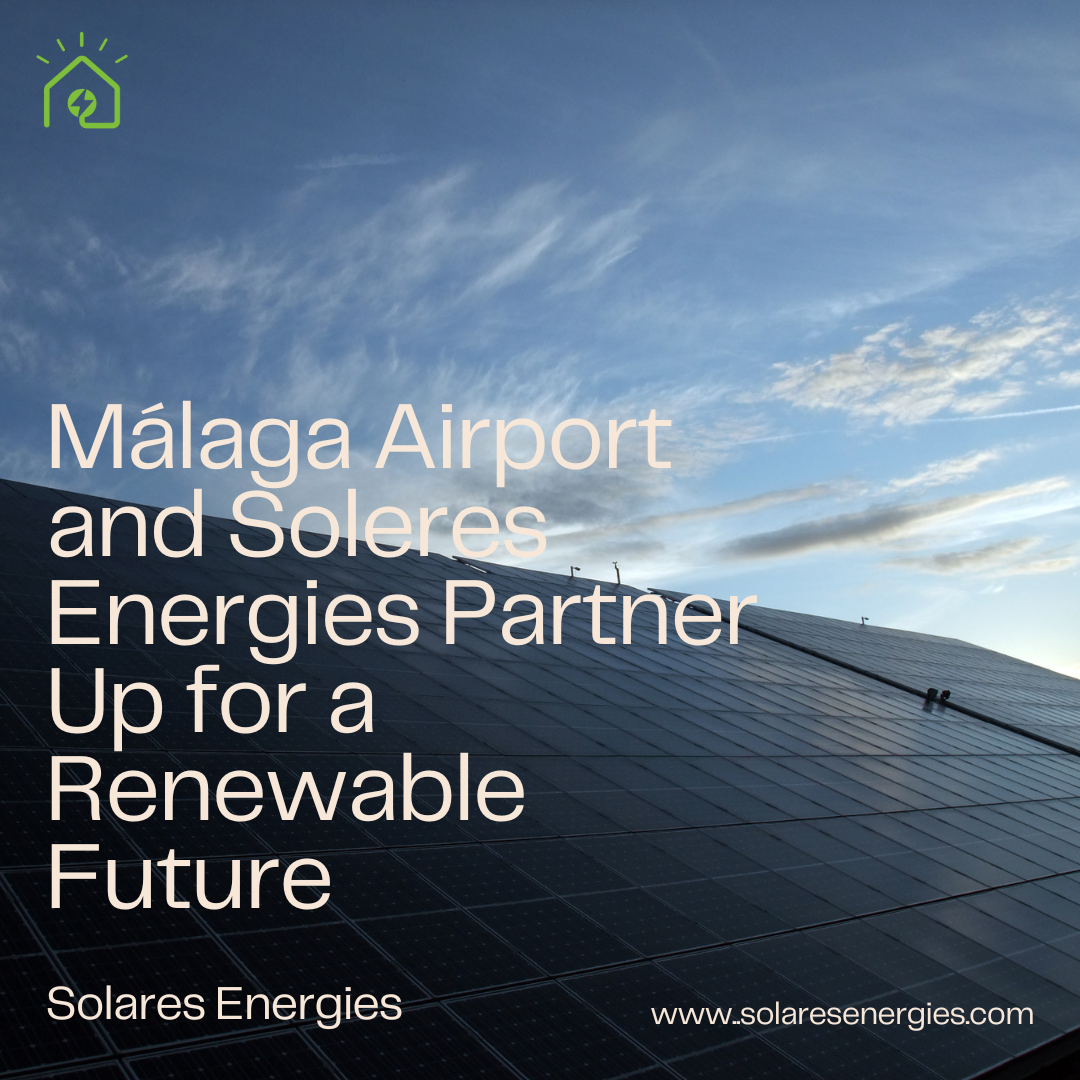Málaga Airport and Solares Energies Partner Up for a Renewable Future
In a major stride towards renewable energy, Málaga Airport has partnered with Solares Energies, a leading renewable energy company, to transform its operational infrastructure. Through this partnership, the airport has marked the dawn of a new era, transitioning to an environmentally sustainable model by harnessing the power of solar energy.
Solares Energies, known for its commitment to green energy solutions, has played a pivotal role in this transformation. Their expertise and cutting-edge technology have facilitated the installation of solar panels, heat pumps, and solar carports equipped with car chargers at Málaga Airport, effectively helping the airport to tap into the renewable energy realm. More details about Solares Energies’ groundbreaking work can be found on their website: www.solaresenergies.com.
 One of the major renewable energy sources that Solares Energies has helped Málaga Airport harness is solar power. A series of solar panels have been installed throughout the airport’s premises. Given the region’s abundant sunlight, these solar panels have proved to be a smart and efficient source of energy, substantially meeting the airport’s electricity demands, and reducing reliance on traditional, non-renewable energy sources.
One of the major renewable energy sources that Solares Energies has helped Málaga Airport harness is solar power. A series of solar panels have been installed throughout the airport’s premises. Given the region’s abundant sunlight, these solar panels have proved to be a smart and efficient source of energy, substantially meeting the airport’s electricity demands, and reducing reliance on traditional, non-renewable energy sources.
Complementing the solar panel infrastructure, heat pumps have also been integrated into the airport’s energy system. These heat pumps, designed to extract heat from the ground, air, or water, are an efficient solution for maintaining the airport’s indoor temperatures. This not only reduces the airport’s environmental impact but also optimises energy usage.
Solares Energies’ innovative solutions also extend to the airport’s parking facilities. Solar carports – structures that combine the function of shading parked cars with housing solar panels – have been erected across the airport’s parking lots. These installations serve a dual purpose by protecting vehicles from the scorching Andalusian sun while generating electricity.
In a step further, electric car chargers have been incorporated within these solar carports, offering a sustainable car charging points solution for electric vehicle owners. This not only marks a significant progression in the airport’s own sustainable practices but also promotes the use of electric vehicles among passengers and staff.
The partnership between Málaga Airport and Solares Energies is indeed a progressive leap in the realm of sustainable aviation. By facilitating the airport’s adoption of solar power, heat pumps, and solar carports with car chargers, Solares Energies has set a benchmark for renewable energy implementation in airports worldwide.
Málaga Airport’s transition into the renewable age is a shining example of the power of collaborative efforts in achieving environmental sustainability. By tapping into the region’s abundant sunlight with the help of Solares Energies, Málaga Airport illustrates how local natural resources can be leveraged to make significant strides in environmental conservation. As passengers, employees, and global citizens, we can take pride in such initiatives and look forward to a more sustainable future in aviation.
Accelerating Spain’s Renewable Energy Transition: A Shared Effort
Spain possesses the potential to be completely powered by renewable energy by 2050 or even earlier. However, achieving this will require more than technological progress. It calls for managing resource scarcity, reducing energy demand, and innovating in policy-making. Given the energy crisis spurred by Russia, resilience and ingenuity have become even more essential. This article is brought to you by Gonsalo Parrado Hernando and Nathalie Wergles, researchers associated with the LOCOMOTION project. They are working towards establishing a state-of-the-art integrated assessment model, WILIAM.
Aligned with its national strategy and EU-wide goals, Spain is striving for carbon neutrality by 2050. The Russia-Ukraine conflict has underlined this ambition, exposing the vulnerability of EU member states that rely on imports of fossil fuels, oil, and materials. It has prompted a revaluation of the current situation.
Today, Spain is exploring methods to secure its climate goals while fostering an economy that is resilient, sustainable, and secure. Recent research conducted under the LOCOMOTION project indicates that Spain is on track to achieve 100% reliance on renewable energy.
The renewable energy economy is indispensable. Calls for fully renewable energy have echoed since the 1970s, spurred by reports like Limits to Growth (1972) and the first oil crisis (1973). Recent evaluations of the unfolding climate crisis underscore the necessity of this transition.
Over the years, numerous studies have highlighted the economic and technological viability of this shift. CAN Europe and EEB have recently outlined an achievable plan for a nature-friendly transition to renewables in Europe? With political commitment and advancements in energy storage, green hydrogen, programming, and electronics, these ambitions are being realised.
Several studies, including the most recent LOCOMOTION research, have assessed potential scenarios for Spain to transition to a renewable energy system. The aim is for Spain to achieve 100% renewables by 2050.
EEB has proposed a feasible path towards 100% renewables in Europe a decade earlier than anticipated. However, the primary focus of the study remains in line with national climate objectives. It offers invaluable insights due to its methodological advancements and thorough analysis.
Fast forward to 2030. New technologies have significantly reduced Spain’s carbon footprint. Biofuels have replaced gas, diesel, and fuel oil in areas where direct electrification was not possible. Rail transport is fully electric. Heat pumps and district heating have superseded gas boilers, leading to the synergy between industry and residential buildings. Advanced energy storage, a diverse mix of renewables, and smart grids have rendered nuclear power obsolete.
By the mid-century, the Spanish energy system has been completely decarbonised in accordance with Spain’s official roadmap. Solar power is commonplace, and fossil fuel use in aviation has plummeted by 93%, replaced by electro-fuels derived from green hydrogen. By strategically utilising hydrogen, and secondary biomass, and reducing energy demand by 50%, a 100% renewable energy system has become a reality.
Despite these optimistic prospects, real-world challenges remain. The transition will necessitate a significant quantity of materials to manufacture solar cells, wind turbines, batteries, and electrolysers. Europe’s reserves may fall short of the projected demand for many of these materials, and even responsible mining has potential negative impacts.
Another concern lies with biomass. When will the environmental cost of biomass production start to reflect in price changes? How will the Spanish biomass sector balance domestic heating requirements and the export market to cover the trade deficit? Is it possible to nurture a thriving sector without perpetuating regional disparities in the EU?
While Spain has been an advocate of renewable energy since the 1980s, its economy is still reliant on gas, and the energy sector is responsible for a significant portion of the country’s emissions. Despite past support for fossil fuels, Spain has recently begun to withdraw from the Energy Charter Treaty (ECT), a significant step in moving away from fossil fuels.
Given Spain’s substantial gas storage and recent government initiatives to cut down on gas consumption and boost decentralised renewable adoption, the country has managed to remain resilient during the energy crisis. In the coming years, Spain must simultaneously develop renewable energy, new technologies, and energy efficiency measures to build a 100% renewable and efficient energy system.
Decarbonising Spain’s economy will hinge on various factors, including increased investment in renewables, integration with the European power network, and competitive energy markets. Spain will need to make substantial efficiency gains, adopt policies according to emerging trends, and reduce energy intensity in nearly every sector.
Importantly, Spain, alongside other European countries, must significantly reduce energy consumption and material demand. This step is crucial in constructing an economy that aligns with the Paris Agreement, where people and nature can coexist sustainably.



 Solar Panel Products & Articles
Solar Panel Products & Articles Other Products & Services
Other Products & Services



